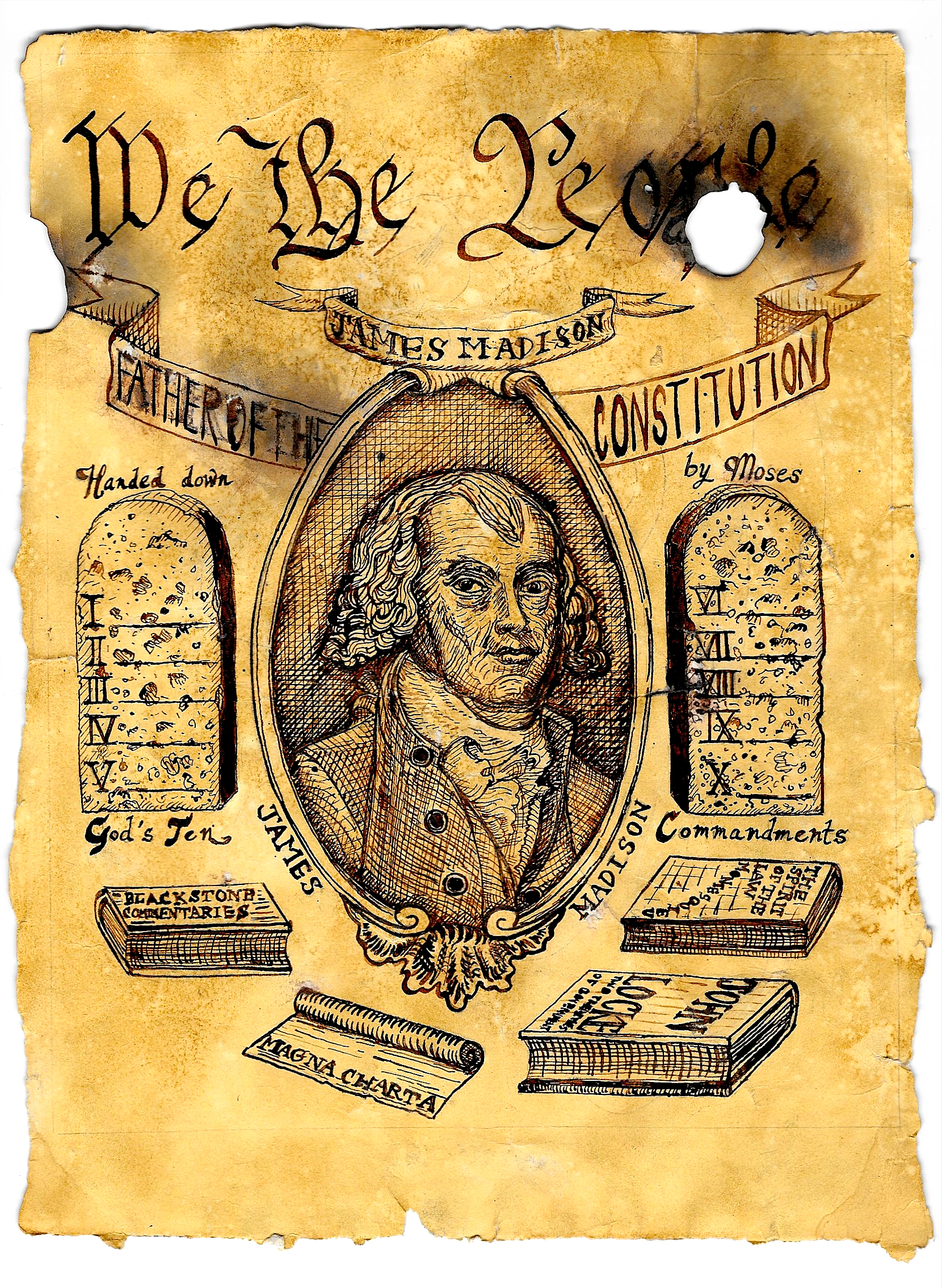Where Did the Founders get their Ideas, quill and bullshit ink on tea and coffee stained paper, Bryan Anthony Moore, 2014. Illustration of Perfection Learning Text “Where Did the Founders Get Their Ideas? . . .” for Basic Principles of American Government.
Perfection Learning – Basic Principles of American Government
Text has a table entitled “Where did the Founders get their ideas?” The introductory section to the table states: “When the Framers set out to write the Constitution, they drew upon the wisdom of philosophers, historians and economists. Here are a few of the people whose words influenced the content of that remarkable document.” Moses is listed first on this list, followed by John Locke, Charles de Montesquieu, and William Blackstone. The “concept” Moses is alleged to have contributed is that “A nation needs a written code of behavior.” The description of Moses includes the following sentences: “During their years of wandering in the desert of the Sinai, Moses handed down God’s Ten Commandments to the Hebrews. These commandments now form the bedrock on which the Jewish, Muslim, and Christian codes of behavior are based. The full account of Moses’ life can be found in the Bible’s book of Exodus.”
Unlike the contributions of the three other figures mentioned in the table, the contribution of Moses is highly nebulous and contestable. The passage neglects to mention which types of codified behaviors influenced the Framers, and thus makes it difficult to evaluate this claim. The Framers, for instance, were not influenced by the first four Commandments, which deal with matters of religious belief and practice. In fact, notable framers such as James Madison led the battle against government punishment for unorthodox religious belief. Further, stating that “Moses handed down God’s Ten Commandments” is very close to endorsing a religious claim. Stating, for instance, that “Jews and Christians believe that Moses handed down God’s Ten Commandments” would have been more acceptable. Without this qualification, the text seems to endorse the truth of these biblical claims [emphasis mine].[1]
This statement, “Moses handed down God’s Ten Commandments”, in a public school textbook is a complete violation of the First Amendment of the Constitution. Not only is it stating that Moses was a real historical figure, which is no small leap, but it’s also stating that there is a God and he is the G-d of the Judeo-Christian traditions. In this instance, the assertion that Moses as a law-giver, was highly influential to the Framers of our Constitution, is the least of the transgressions. The text continues; “During their years of wandering in the desert of the Sinai, Moses handed down God’s Ten Commandments to the Hebrews. These commandments now form the bedrock on which the Jewish, Muslim, and Christian codes of behavior are based. The full account of Moses’ life can be found in the Bible’s book of Exodus.” thereby endorsing the biblical book of Exodus as an authentic historical narrative. Notice only the “Bible’s book of Exodus” is recommended, if the publishers weren’t unconstitutionally endorsing a specific religion, along with the factual existence of both the Christian God and Moses, then why couldn’t a student look at the book of Exodus in a Torah as well as a Bible?
Notes
[1] Dr. Edward Countryman. “Writing to the Standards: Reviews of Proposed Social Studies Textbooks for Texas Public Schools.” Www.tfn.org, n.d. http://www.tfn.org/site/DocServer/FINAL_executivesummary.pdf?docID=4625.
